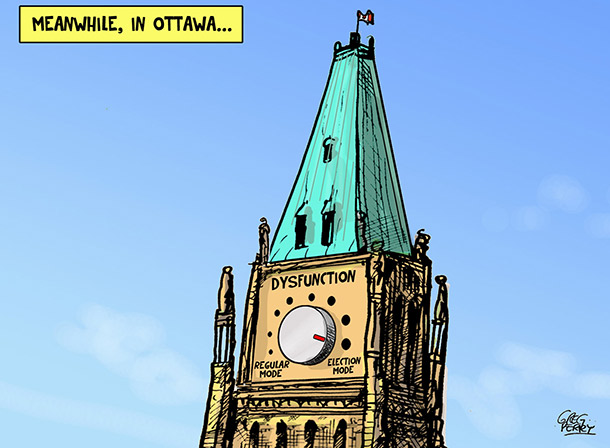Since coming to power, the administration of Stephen Harper has made headlines for undermining government opennesses and accountability, introducing divisive if not outright unpopular laws, and ignoring or intimidating critics, including the fourth estate.
On such foundations dictatorships are built, leading to concerns about the state of our democracy. But how much of that foundation was actually laid by Harper, and how much was there before he even became prime minister?
Two recent books on the Conservative leader appear to have somewhat different answers, with our country's future dependent upon how citizens respond to that question.
In Party of One, author Michael Harris recounts a 1997 speech in which a younger Harper essentially described our system of government as a dictatorship run by the prime minister of Canada.
For Harris, that description was "inept," ignoring the "opposition's role in bringing out public information," as well as the work of all-party committees in "holding the government to account." Given such context, many readers might assume the speech was instead simply a foretelling of Harper's approach to government -- an approach Harris appears to frame as anomalous.
Harris didn't respond to an email I sent requesting comment. But Mark Bourrie, the author of Kill The Messengers, confirmed he thinks the future prime minister's description of our political system was simply truthful.
In that book, which was released about three months after Party of One, Bourrie acknowledges the prime minister "harnessed the [political] system to suit his own agenda and personality" and has created a "new, undemocratic way of ruling Canada."*
Yet that system, as well as our society, is suited to being harnessed. After all, according to Bourrie, "Once we install a new regime, usually to punish the last bunch of rogues, most Canadians feel the country is in the hands of the winners until the next election."
Our political system then turns that feeling into fact, with the biggest winners of them all being the country's prime ministers who have often worked to fortify and expand their magisterial powers over both the citizenry and its representatives.
The best we can hope for
Indeed, I would go further and suggest the principal difference between Harper and many of his predecessors may be that he has been more likely to use the iron fist of his office and less likely to cover it with a velvet glove.
But it's Harris's somewhat decontextualized portrait of Harper -- standing mostly alone rather than against a backdrop of societal deference and slow-drip dictatorialism -- that understandably appears most often in the news.
After all, in politics as in sports, teams, players, politicians and parties are easier and more appealing to cover (and read about) than the rules of their respective games.
Think about it: just how many Canadians think a treatise on the perils of party discipline pairs well with their Cheerios and a cup of coffee at 7 a.m.?
The consequence is that citizens may believe that, if Harper is defeated, a Party of One will be replaced by a Government of the Many.
But the best we can probably hope for is a Government of the Few. And, in any case, the rules that have made it, in most cases, completely legal for Harper to do what he has done, will remain -- something Canadians might not find out until his successors almost inevitably exploit them.
What's really needed then isn't an election, but a national conversation about what we want from our political system rather than the politicians within it.
Otherwise our democracy will continue to crumble, and in the process bury what little say we still have in this country between elections.
*Disclosure: I provided Bourrie access to an online copy of my documentary, Whipped: the secret world of party discipline, which is mentioned in his book. My name is also mentioned in the acknowledgements section of Kill the Messengers. ![]()
Read more: Federal Politics

















Tyee Commenting Guidelines
Comments that violate guidelines risk being deleted, and violations may result in a temporary or permanent user ban. Maintain the spirit of good conversation to stay in the discussion.
*Please note The Tyee is not a forum for spreading misinformation about COVID-19, denying its existence or minimizing its risk to public health.
Do:
Do not: